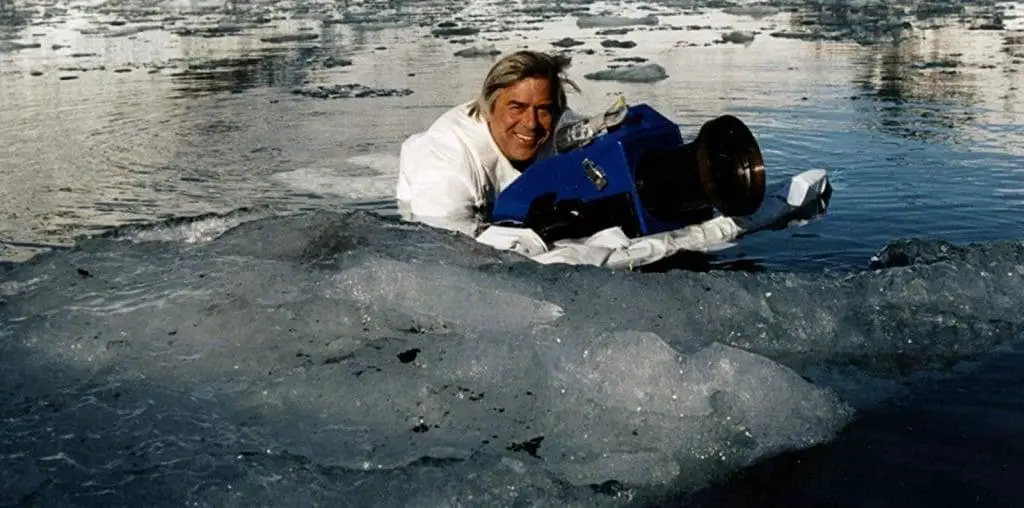
Around the same time, Henson was looking towards getting his own show on the air. Two specials were produced for television, “The Muppet Valentine Special” and “Sex and Violence”, which attracted the attention of British producer Lord Lew Grade. Through the efforts of Lord Grade, Henson and company traveled to England and shot two episodes of what would become “The Muppet Show”. Through those two episodes, Henson and writers Jerry Juhl and Jack Burns determined what worked on the show and what didn’t, refining the format as they went along. Some of the concepts were born in “Sex and Violence”. “The idea of having their own house band was one of the early things established,” Nelson says. “The two old guys, Statler and Waldorf, were part of that as well. Originally, rather than being two old gentlemen in the balcony, they were two old gentlemen in a staid old club. Actually, I had done one of the old guys (Statler) in that. (After the two shows were finished), we wanted to polish it up, so everyone could look at it and say this works and this doesn’t work this way, and lets put this bit here. They wanted a chance to play with it and give it the best possible chance it could have. (However), when they went back in ’76, after the first two shows were shot, I did not go with them, because my daughter was very ill. She had cystic fibrosis and we spent summers together. That was a very important time for her and I asked Jim if I could not be part of the first season. In doing that, I had to lose certain characters, Statler being one of them. He was a regular character and they needed him, so Richard (Hunt) took him over. At that time I think John Lovelady went and I think he worked the first year. He did characters like Crazy Harry, originally, then I took him over once John left.”
Nelson admits that he was “essentially the utility batter on the show then.” His versatile voice was perfect for the variety of backup characters needed for each episode. Need a pig that would not be a recurring character, but was vital to the episode? Jerry usually found the perfect personality for the guesting swine. “I would do all the new characters that would come in for one show. I did a lot of voices, so I was very useful in that way. I think it worked out okay in that they had a lot of things that they eventually let go. In the first few shows, they had a couple of houses that would talk. The show at that point was still a flexing entity. It was struggling to find its form, seeking its own level.”
Between 1977 and 1978, while the Muppet performers were bouncing between England and the U.S., where they worked on “Sesame Street” and “The Muppet Movie”, “The Muppet Show” had premiered with lukewarm results. At least, in the States. Perhaps because the show was syndicated and difficult to find in some markets, “The Muppet Show” was not an instant success for the home team. In England, however, it was a smash. “Richard and I were certainly surprised when we came back from the States. They had a song from the show on “Top of the Pops”, and it reached number seven or nine on the charts over there. Everyone in England knew about it, loved it, but it took another year for it to find the vaster audience here in the States.”
The company shot eighty-four episodes in four years, and in that time creativity among the troupe was at its peak – a stark contrast to the way things were run at the England studios. “We pretty much had to get the show done by Friday. The British Union was very strict about that. When eight o’clock Friday came, they would throw the switch and turn out the lights. And that was it. No overtime. We pretty much had to get that done or else we’d have to shuffle to get a piece of something we hadn’t finished. That made us all very flexible, which of course, just pushes you to grow, in terms of performance. You have to grab things out of mid-air. Things would come up as they were taping, so a written piece would change. Not always drastically, but always in different ways. They’d yell, ‘oh, we need a character for this’, and the shop would quickly put something together and then go right into it. Things were always cropping up and changing, and having to deal with those changes made us all more flexible, I think.”
For the company, an average week had a structure, but there was plenty of room to move within that structure. “We would have read-throughs on a Sunday morning. And in the course of that read-through and the actual fact, sometimes things would change quite drastically. Monday we would put down the vocal and music tracks for the show. Tuesday, Wednesday, Thursday and Friday we would tape the show. Usually the first day was reserved for the guest. As often as not, we wouldn’t finish with the guest. Usually the guest had a big production number, which always took longer to do. Sometimes the guest would be held over for another day, which would diminish the time we had for the show. In terms of character and creativity, they’d write things like ‘four Japanese pole-vaulters’ or ‘The Flying Zuchini Brothers’ – the acrobats – those things we would usually have so much fun with, they would inevitably show up in other scripts because they were so funny.”
The story continues in part three of THE GEEKS SHALL INHERIT THE EARTH: A BIG HAND FOR THE SUPPORTING MAN – JERRY NELSON>>>
